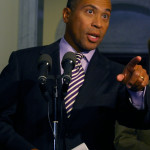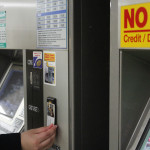[mediagrid cat=”22446″]
Democratic presidential candidate Hillary Rodham Clinton visited Boston Thursday along the campaign trail to join a conversation with state leaders about substance abuse.
Boston Mayor Martin Walsh, Massachusetts Attorney General Maura Healey, Myechia Minter-Jordan of The Dimock Center and Joanne Peterson of Learn to Cope joined Clinton in her address at the Boston Teacher’s Union Local 66 Hall in Dorchester.
“I became focused on this for the reason that many of you did, because of people I know, people I care about people who struggled, people who were in recovery and failed, people who overdosed, people who look for the kind of understanding support-treatment continuum that is really hard to find,” Clinton said.
After speaking with people along the campaign trail and getting a sense of the problem, Clinton said addiction and treatment became a top priority in her campaign.
“I have to tell you that I spent a lot of months listening to people,” Clinton said. “I’m glad I did because you can come to a campaign with your mind already made up about everything.”
Clinton proposed a $10 billion program that over 10 years will support states and cities with effective substance abuse prevention and treatment plans. The program would also move toward a results-based program.
“We’ve got to lift up the best programs, we’ve got to by replication and we’ve got to provide more services,” Clinton said. “When you are in need, or a family member is in need, you should have a place to go, right there and then.”
Walsh explained the need to address the lack of prevention efforts in areas nationwide.
“This issue that we have, when you think about the people here and the people in this room today, it has to be on a national level, it has to be on a state level, it has to be on a district level, it has to be on a neighborhood corner level, and I want it to be about this discussion today,” Walsh said.
Clinton gave Walsh credit for being “so forthcoming, so candid [and] so open” about substance abuse problems in the Commonwealth.
“It’s because of your work and [because] your Attorney General and her campaign did the same thing, talked about removing the stigma,” Clinton said. “I don’t think, even a state that is blessed with leaders like this and others who have been mentioned can do this alone.”
Healey provided some statistics to illustrate how widespread the addiction epidemic is in the United States and stressed the need for change.
“I know that here in the United States, we’re just five percent of the world’s population, we consume 80 percent of the world’s opioid supply and we need to shift the conversation, change the lens, change the culture,” Healey said. “It is about prevention and education and intervention and treatment and sustaining treatment.”
Several attendees said they were excited and hopeful about how leaders are addressing drug addiction and abuse.
Katrina Ciraldo, 29, of Jamaica Plain, said she appreciates the support to combat addiction.
“This commitment is a huge deal, I don’t know if people realize that. And the substance abuse community, they’re vulnerable people,” she said. “Like somebody was saying it was a new thing, and the people behind me were like, ‘This isn’t new, it’s been around for a long time.’”
Eileen Zalisk, 62, of Lexington, said she likes how attendees spoke about the issue on a local level.
“I thought it was a very strong meeting because it dealt with this very serious issue locally from a variety of different perspectives,” she said. “[Hillary] was the first person to really acknowledge this issue in Massachusetts and New Hampshire. I just thought there were a whole range of approaches and solutions that were brought to a very difficult and challenging problem.”
Darshali Vyas, 23, a medical student, of Longwood, said she looks forward to continuing these conversations.
“Hearing [Hillary] become the first presidential candidate in this race to commit to 30 million [people on HIV/AIDS treatment] by 2020 is a huge deal, something no one else is doing,” she said. “Especially after how far these aids funding mechanisms have seen cuts to funding in the past several ages, she’s really the only candidate who’s spoken out so far about this.”




